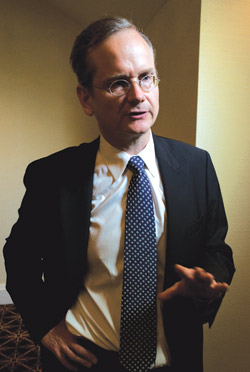Law profs debate electoral college role after Lessig calls for Trump rejection

Larry Lessig. ABA file photo by Wayne Slezak.
Should the electoral college put Hillary Clinton in the White House because she won the popular vote?
Harvard law professor Lawrence Lessig answered the question in the affirmative in a Thanksgiving Day op-ed that has spurred disagreement, the National Law Journal (sub. req.) reports.
“Conventional wisdom tells us that the electoral college requires that the person who lost the popular vote this year must nonetheless become our president,” Lessig wrote in the Washington Post op-ed. “That view is an insult to our framers. It is compelled by nothing in our Constitution. It should be rejected by anyone with any understanding of our democratic traditions—most important, the electors themselves.”
Lessig argued that the electoral college was intended as a safety valve that acts “like a judge reviewing a jury verdict.” The electors, he argues, “were to be citizens exercising judgment, not cogs turning a wheel.”
Several law professors are opposing Lessig’s idea. Writing in the Atlantic, University of Baltimore law professor Garrett Epps says Lessig’s concept of the rationale for the electoral college is wrong. “Nobody in 1787-88 thought of the electors as anything but what they are today—faceless hacks whose ideas and judgment are neither wanted nor permitted,” Epps says.
Also opposing Lessig’s idea are University of California at Irvine law professor Rick Hasen and George Washington University law professor Orrin Kerr, who expressed his opinion at the Volokh Conspiracy.
Hasen writes that the electors are chosen to translate the will of the people, rather than exercise judgment, in a post at his Election Law Blog. He adds that the rules were set in advance, and choosing Clinton “seems to go against rule of law ideas.”
Epps also cited the rule of law. “I wish as much as anyone that December 19 was an exit ramp out of the coming four-year nightmare,” Epps writes, referring to the date when the electors meet. “But in those four years the American people are going to need their Constitution, and they need to be able to trust those who claim to revere it. It won’t help matters if constitutional seers and scholars begin to convince themselves that the ‘Founding Fathers’ are on the side of whatever outcome hinders Donald Trump. That will only further discredit the rule of law in the eyes of a people who clearly have doubts about it going in.”



